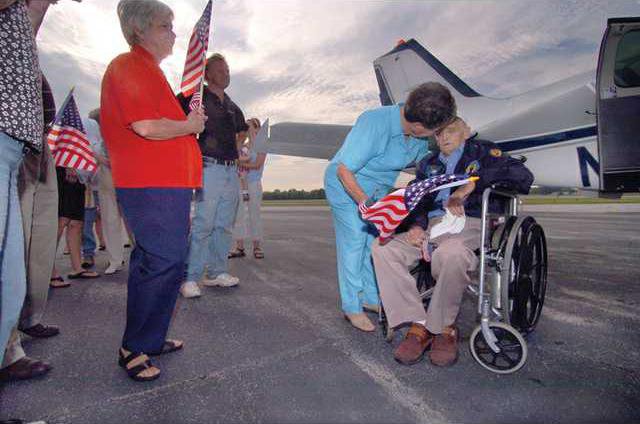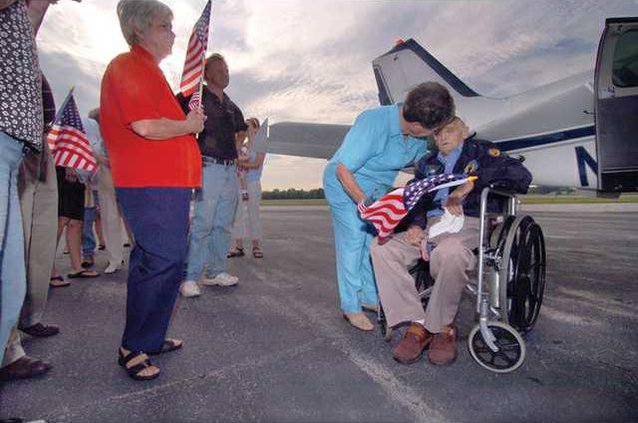For several minutes, Verl Duane Fisher sat in the wheelchair, wiping away tears and accepting the embraces of friends and loved ones.
Then, jabbing a thumb toward the plane next to him at Lee Gilmer Memorial Airport, he said, “Let’s start this thing up and get outta here!”
The command drew laughter from the 50 or so flag-waving people gathered around him.
Fighting spirit still there.
“He’s a determined man,” said Lisa Fry, his Northeast Georgia Medical Center hospice nurse.
The seriously ill World War II veteran and POW was helped onto the plane, where he was accompanied by a local doctor.
With the help of a local pilot preferring to remain anonymous, Fisher began the nearly 2 1/2-hour journey Friday morning to his native Illinois.
“I’m never going to see him again, I know that,” said Nell Dale of Gainesville, a close family friend, wiping away tears. “I hope this (trip) isn’t going to be too much for him.”
Fisher, 90, had lived in Gainesville for the past eight years, moving here from Assumption, Ill., to be close to family after his wife, Frances Louise, or “Cookie,” died.
He lived in an apartment for several years. After his health worsened about four years ago, he moved to Dogwood Forest Assisted Living Center in North Hall. Fisher has been in hospice care for the past three or four months, Fry said.
Fisher will stay in a nursing home about 30 miles from Assumption, where he was born and raised, and live close to one of his sons, who “can check in on him every day,” said his daughter, Peggy Hudson of Jackson, Wyo.
Perhaps embarrassed Friday by his sobs on the tarmac at Lee Gilmer, he looked at the crowd around him and said, “They’re going to kick me out of the Illinois Reserve without a parachute.”
Fisher exuded patriotism throughout his life but resisted being called a hero or having attention drawn to him, Hudson said.
Those who lost lives in combat or came home disabled deserved the attention.
“Dad always looked at those men as the real heroes,” Hudson said.
Still, Fisher’s life story extends way beyond his hometown of 1,200 people, where he ran a jewelry store and insurance company and worked as Realtor, all while raising three children with his wife.
In 2004, he decided to tell his story to Hudson, who never heard him talk about his war experiences while growing up.
Hudson, 61, wrote it up and has since included that document in a thick scrapbook of her father’s life, including POW paperwork and the Western Union telegram notifying Fisher’s wife that he had been reported missing in action.
He graduated from Army Air Corps flying school in January 1943 and married Frances three months later, before leaving for Chelveston, England, home of a Royal Air Force base.
Fisher would go on to fly the B-17 “Flying Fortress” in bombing raids over Germany.
Pilots had to fly 25 missions before they could go home. Fisher’s plane was shot down on his 24th mission on Oct. 14, 1943.
“We should never have gone on this mission. Takeoff was delayed due to the weather,” Hudson wrote, quoting her father.
“We never got in close formation when German fighters’ flak hit us. Our controls were shot, so we had no control of our plane. The intercom system went out. We rang the bell to bail out.”
Fisher parachuted into an open field, hurting his back and knees.
“German soldiers ran up with bayonets. They told me to get up and pick up my chute,” Hudson wrote.
Fisher was taken to a village jail, where he stayed for three days and was questioned. He only gave his name, rank and serial number.
He was sent by railroad to Stalag Luft III prison camp in Germany.
“There were 180 men in our barracks with a divided partition on each side,” Hudson wrote. “The barracks were open, except at each end, where there was a room for the two officers in charge of the building.”
Fisher recalled how every morning “we fell outdoors and were counted. ... We stood outside regardless of weather conditions until every barrack was checked out.”
Days were “spent playing cards and walking, reading (and) lying in our bunks thinking of home, our wives and family,” Hudson wrote.
Prisoners were marched out of the camp on Jan. 28, 1945, and eventually wound up, by train, at Moosberg, Germany, about 40 kilometers northeast of Munich.
“There were about 20,000 prisoners there. Living conditions were terrible: toilets running over, fleas and no showers,” Fisher recalled.
Eventually, U.S. Army Gen. George Patton’s Army liberated the encampment.
“A few days later, we were flown to a tent camp in France,” Fisher said. “From there, a boat to New York. I called my wife and she met me in Chicago. That was June 2, 1945.”
Fisher would continue serving in the military, rising to the rank of first lieutenant in the Air Force Reserve when he was discharged on Sept. 28, 1957.
Through the years, Fisher made sure he and his family paid their respects to veterans on Memorial Day.
“He didn’t march (in parades), but we always went to this ceremony at the cemetery,” Hudson said. “He participated in all that, but he just didn’t want to be honored.”
Hudson said her father told her that and he and Cookie enjoyed a good life and “now, with such hard times, he wanted people to help the veterans and their families.”
He has started a foundation that provide assistance in just that way.
After Cookie died, he moved to Gainesville, where Hudson and her husband had opened a business. He settled first into an apartment, before his health began failing and he moved to Dogwood Forest.
The walls of his Dogwood Forest room were covered with pictures of his military past, as well as family portraits, photos and other memorabilia.
Hudson moved to Wyoming a couple of years ago, leaving him with no immediate family in the area.
“My sister, brother and I would take turns coming in and visiting,” she said.
A local resident visiting his mother at Dogwood Forest got to know Fisher and has worked with Fisher’s family to fly him to Illinois, preferring to remain anonymous.
“That’s where his final resting place is and that’s where he wants to be,” Hudson said. “I’m happy for him.”
On Friday, two members of Charlie Company, a Gainesville-based Georgia National Guard unit, greeted Fisher and thanked him for his service as the veteran sat in a wheelchair at the airplane.
“Those guys did so much for us,” said Capt. Frank Barroqueiro. “Anything we can do to honor them, we need to do.”

